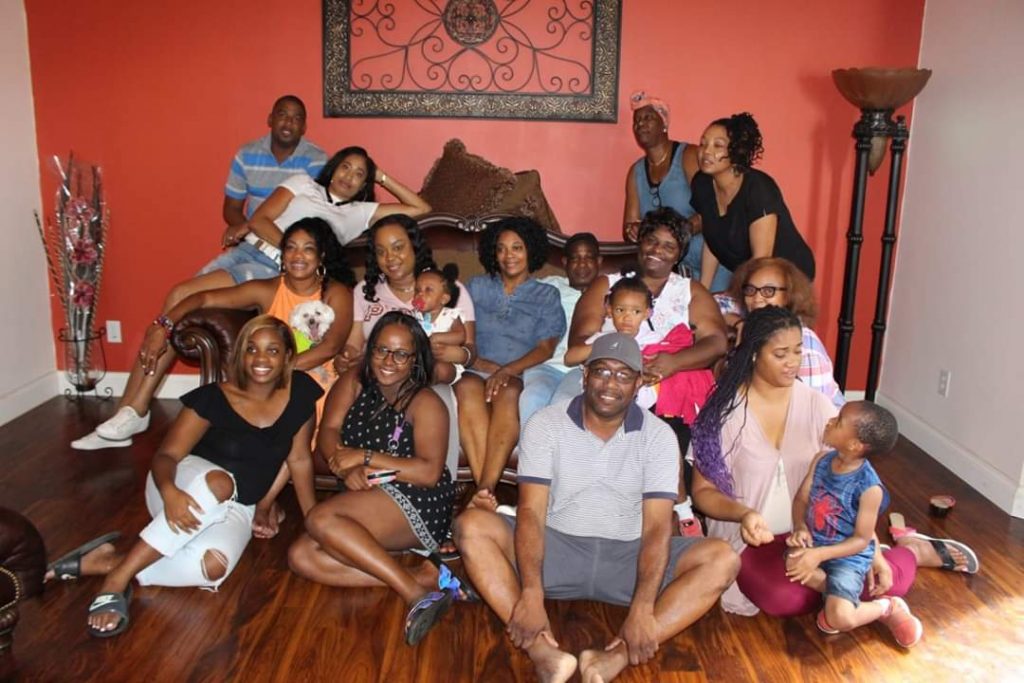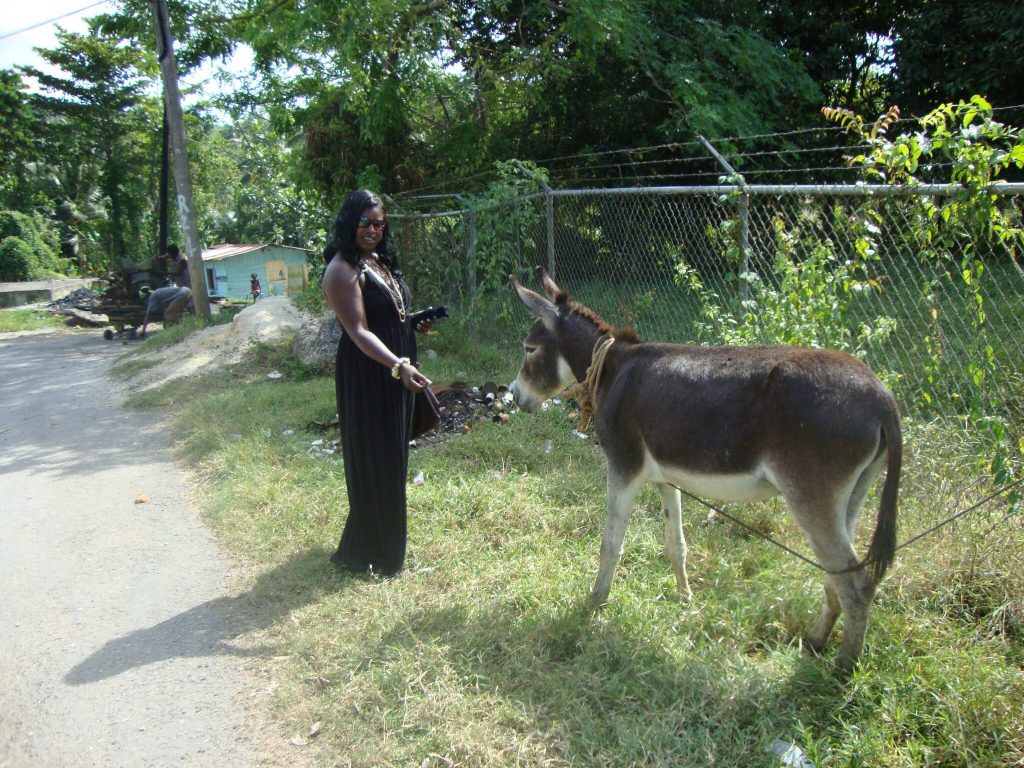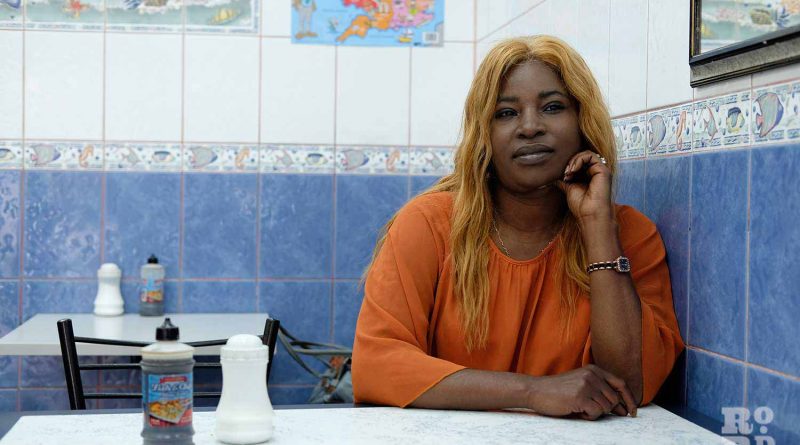Karen’s story: a single mother’s world was shattered by hostile immigration policy
Karen Burke had lived in Bethnal Green for nearly 20 years when she lost her job over issues with her immigrant status. Despite having the right to live and work in the UK, she had a career snatched away from her and has been left isolated from friends and family.
Burke, 45, has fought her way back from the brink, but she now faces an uncertain future. She is still looking for work, one of thousands of legal residents left struggling by the Home Office’s ‘hostile environment’ legislation.
Brought to the UK from Jamaica by her love of fashion (she had worked with Barry Moncrief and beaded the dress of Miss Jamaica World 1997 by the time she was 19), she stayed to study computer science. But she soon found her true vocation was care work.
‘I was about following my heart, about what makes me feel comfortable, because the older you get you want to find yourself,’ she says. ‘I thought that I needed fashion, but then I find out that I have a compassionate side to me, that I wanted to help my peers in school who didn’t have parental guidance.’
There is an unfiltered honesty to her emotions as we talk. She laughs (and sings) as readily as she cries, but there’s a confidence beneath it. She is generous with her smile, wears a blonde wig fashioned by herself ‘to test the look’, and her eye for a good coat completes the insouciant air that East End fashionistas do so well.
East London has been Burke’s home for her entire time in the UK. As soon as she saw it she knew it was her element. ‘When I came to Bethnal Green there was a presence,’ she says. The multicultural nature of the place was unpolished, but it was real. ‘My energy can be used in this area.’
And so it proved. By the summer of 2017 Burke had been with her employer, Mighty Care, for thirteen and a half years, working in homes across Bethnal Green, Bow, and Mile End. She and her son had just moved to a new home off Bethnal Green Road.
Burke had been at her place work for thirteen and a half years when she received a phone call. She remembers that date too, 26 September, 2017. They said to me, ‘We’re sorry, Karen, we need to see your biometric. And I said to them, what’s a biometric?’
Biometric Residence Permits are identity cards introduced by the Home Office in 2015. They contain information for those with permission to live in the UK for more than six months. Although Burke received her indefinite leave to remain status in 2004, which meant she allowed to live and work in the UK for as long as she was willing and able, she was told if she didn’t bring in a biometric card within a days she would lose her job.
Burke thought they were joking. She went to see her manager, who said it was true.
‘I said this is not professional,’ Burke says. ‘I’ve been working with the company for almost 14 years and this is the way I’m going to be treated? You know I’m a resident here.’ Burke’s manager was sympathetic, but clearly preoccupied. ‘She didn’t want to know, because she said there’s a lot of pressure to sort these things out.’
The pressure Burke’s manager was talking about was a series of policies which have been rolled out by the Home Office since 2014. Their purpose was, as then Home Secretary Theresa May put it in 2012, ‘to create, here in Britain, a really hostile environment for illegal immigrants.’
This took various forms, including increased background checks and reduced access to public services. For employers it meant lowering the threshold for punishment. Before 2016 an employer needed to ‘knowingly’ employ someone without the right the work to face criminal charges. Since 2016 ‘reasonable cause to believe’ is enough for them to face fines of up to £20,000 and up to five years in prison.
Under this sort of pressure it’s not surprising that many employers act out of fear. This meant a short deadline for Burke. Even though she’d had indefinite leave to remain status for well over a decade, her employer needed her biometric to be sure they weren’t falling afoul of new legislation.
Updating to a biometric card costs £229 and the decision takes up to six months. Speeding up the process with the Home Office’s ‘super priority service’ requires applicants to pay a further £800. With no guidance on how to apply, and time at a premium, Burke was duly told by her employer to hand over her keys and uniform.
‘I don’t know how explain it. It was like a Windrush came in and just snapped me. I didn’t know what to do, I didn’t know what to think. After I handed in my key that day I was walking down the road and I didn’t know myself anymore.’
She picked up her son in her uniform that day, knowing the security and purpose that it meant had been ripped away. The next day she got up, took her son to school, and didn’t know what to do. She didn’t have a rota.
The next few weeks she spent wandering the streets in the vague hope someone would offer a job even though she knew she couldn’t accept it. The suddenness of what had happened put her into a state of shock.
‘I was lost. It felt like my world was caving on me, but being a support worker I have to support myself, and support my boy, because I don’t want him to know what’s happening.’
For a time Burke dressed up in the mornings and pick up her son in the afternoon with a packed bag so he’d think she was coming from work. She didn’t want him to know what had happened. She wanted him to feel as safe and secure as he’d always felt, though she suspects he felt the shift.
‘They’re small but they know what you’re going through. I tried not to let him know that I was that unhappy. I couldn’t give him the things I used to give him, couldn’t go the places we used to go. Couldn’t go on the small adventures we used to do, riding the Thames, travelling the bus. It affected me so much.’
Since her troubles began Burke has distanced herself from family at home and abroad. She didn’t want to be a burden. ‘I rode the storm on my own, because my stress can pull them down, and then it will pull my mum back home down. They look to me as the head.’
Burke hasn’t seen her mother in four years, the last time being for her father’s funeral. She doesn’t want to expose her to it. When she has a job, she will be ready to go back. ‘I’m in a good place now, mentally, emotionally, physically. Just for me to get a job. That is the only thing for me.’
Burke cries as she retells the story. ‘My world was tearing apart. I don’t like remembering. I’d never experienced something like that.’ We talk in a side room at Praxis, a charity based in Bethnal Green that provides support to migrants and refugees in London.
Praxis was Burke’s salvation, but it appeared in the unlikeliest of ways. Several weeks after losing her job, Burke was spotted wandering the street outside Praxis. It was clear something wasn’t right and she was invited in for a cup of tea.
Praxis has been in the news a lot in recent years. It has been a leading voice in condemnation of the Windrush scandal, in which thousands of legal immigrants have lost their jobs and their homes. In extreme cases they have been wrongly deported.
Burke is one of those affected by this new environment. Praxis helped her to secure her biometric card, but she remains unemployed, and the time since has exposed her to the mad limbo awaiting those caught in the crossfire.
A particularly odd novelty was that she couldn’t get a job, but qualified for unemployment benefits. Burke was baffled. More than that, she was embarrassed.
‘It’s bizarre. It’s very bizarre. If I can sign on and get public money, why can’t I work and get my own money? I wanted to work and I couldn’t work.’ She can scarcely believe it now. It was an affront to the way she had lived her life up to that point — independent and free.
‘I don’t like handouts,’ she says. ‘I want to do something for myself.’
Although Burke has now secured her biometric card and reconfirmed her right to work in the UK, she did not get her job back. She is still looking for employment. The experience has opened Burke’s eyes to the experiences of thousands like her who have been squeezed, sometimes destroyed, by clumsy implementation of Home Office policy.
‘I was an able bodied person of my life. Going on, had a nice job, a monthly salary, my son, and then I was knocked along the wayside.’
As well as helping Burke secure her biometric card, Praxis has become a second home. The charity believes in a holistic approach, in which users are not problems to be solved but people to be supported.
She regularly attends the choir and is now part of its service user forum, where she has met others in similar positions to herself. It has confirmed she’s not alone. ‘Praxis has to be supporting them mentally, emotionally, physically. There’s a lot of people going through a lot of things.’
Her voluntary role at Praxis gives her life purpose. Now, when she picks up her son from school, she can can at least tell the partial truth. ‘He asks, mummy are you coming from work? I said yes bubba. Work at Praxis? I say yes bubba.’
In the absence of a job, Burke has found other outlets for her compassion. Even during the most difficult period of her life she seems wired to think about the wellbeing of others rather than her own. Her mind darts from issues of immigration to mental health to homelessness. The abandoned.
She talks with the homeless of Bethnal Green, asking if they’re all right. ‘I see those people on the road, on the byways, in the hedges. You never know, maybe they were people like me, had their job, got that knock, and didn’t know how to come back.’
Burke wants to return to work where she can pick up those who have been knocked down. ‘I need to work with somebody who needs me.’
The Home Office has started to roll out a reparation scheme for victims of the Windrush scandal, but other victims of the same policies, like Burke, have no such resource. Other than home secretary Sajid Javid rebranding the ‘hostile environment’ as ‘compliant environment’, no steps have been taken to repeal the legislation that has so damaged the lives of so many.
In the meantime, Burke must wait in limbo. She raises her son with the same love she has always lavished on him, and she waits for the time when she can face her family again.
She is measured about her treatment, more astounded than angry. The support of Praxis has given her the means to look forward, enjoy what she has, and dare to hope for more.
‘When I cry I don’t cry because I’m sad, I cry because I rejoice, because I passed my past and I walk away from painful memory.
‘I live this day as my last because yesterday is history and tomorrow is a mystery. If you can do good along the byways and hedges, treat people the way you want to be treated.’
Praxis is a charity based in Bethnal Green which supports migrants and refugees in London. Find out how to get involved at praxis.org.uk.



If you enjoyed this piece you may like reading about East End gent Eddie Brown’s mental health story


